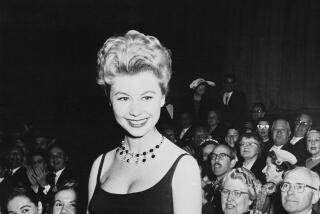Rita Hayworth, Film Queen Who Became Princess, Dies : ‘40s ‘Love Goddess’ Was 68
- Share via
Rita Hayworth, the shy Spanish dancer who films transformed into a “love goddess” of the 1940s and who became a princess in real life, is dead, it was reported today.
She was 68 and died Thursday night, said an aide to Princess Yasmin Khan, Miss Hayworth’s daughter from her marriage to Prince Aly Khan, son of the Aga Khan, who was spiritual leader of 9 million Ismaili Muslims.
Miss Hayworth had suffered for several years from Alzheimer’s disease, an incurable brain disorder which in her case had first been misdiagnosed as alcoholism.
She was reported to have died at her daughter’s New York City home, where she had lived since a court assigned Yasmin custody in 1981.
Images of the red-haired movie siren were among the most vivid on the American scene of four decades ago.
On the screen in nearly 60 films, she was “Gilda,” “Miss Sadie Thompson” and “Salome,” enchanting and provocative, temptation and perfection, the downfall of any unwary man.
Her haunting rendition of “Put the Blame on Mame” in “Gilda,” in which she performed a mini striptease while singing, remains a classic of film folklore.
The film’s success led to four additional Hayworth-Glenn Ford movies: “The Lady in Question,” “The Lady From Shanghai,” “The Loves of Carmen” and “Affair in Trinidad.”
World War II Pinup
A photo of her kneeling on a bed in a negligee was one of the most famous pinup shots of World War II.
Her picture was pasted on the first atom bomb, and she was on the cover of Life magazine four times, a record equalled only by Franklin D. Roosevelt.
She became a real-life princess in a wide-brimmed straw hat at her fairy-tale marriage to Aly Khan in a French village in 1949. The prince was the third of her five husbands. The second was Orson Welles, by whom she had another daughter, Rebecca.
But in recent years, Alzheimer’s disease robbed Miss Hayworth of memory, speech, personality and the ability to function.
Miss Hayworth was born Margarita Cansino in Brooklyn, N.Y. Her father, Eduardo, was a professional dancer who began training her at age 3 and put her on the stage with him at 6. She began working in movies at 16, but life as Rita Hayworth did not begin until a few years later when she was signed by Harry Cohn, head of Columbia Studios.
“Harry Cohn made my black hair red and gave me my Irish mother’s maiden name,” she said.
Her private life soon rivaled her on-screen glamour roles.
A marriage at 17 to oilman Ed Judson ended early in 1943, and that September she married Welles, then Hollywood’s “boy genius.”
After five stormy years, they split up. She said it was “impossible to live with genius 24 hours a day.”
The marriage had barely ended when Miss Hayworth was introduced to Aly Khan. Her affair with the married, playboy prince scandalized Hollywood, then in the thrall of a morals code.
A movement began to boycott her movies, but the storm quieted when the prince was divorced and married Miss Hayworth.
The marriage was on the rocks in two years, and Aly Khan died in a car crash in 1960.
“I loved him,” Miss Hayworth said afterward. “He had such an overwhelming effervescence that he sort of devoured you. The world was magic when you were with him.”
At Columbia, where she was paid $250,000 a year, she clashed frequently with Cohn, whom she called a monster. Their differences intensified when she took as her fourth husband crooner Dick Haymes.
An Argentine, Haymes at the time was facing possible deportation and owed thousands in taxes.
The marriage lasted two years, until 1955. Three years, later she and producer James Hill exchanged vows for what was to be a three-year union.
Hill starred her in “Separate Tables,” a rare heavy dramatic role for her and her last major film.
In the late 1970s, she was making headlines again, sadly pictured as an aging, former beauty turned incompetent alcoholic.
But, as Yasmin later told the court that ruled Miss Hayworth incapable of managing her own affairs, Miss Hayworth’s bizarre behavior was not caused by alcohol and was not curable.
As the disease progressed, Miss Hayworth was unable to read or watch television and only rarely uttered a few phrases, her daughter said.
“It’s so frustrating because you can’t talk with her,” the princess said in 1982. “I don’t know what she can understand, but there are fleeting moments when I’m sure that she’s at least somewhat aware.”
More to Read
Only good movies
Get the Indie Focus newsletter, Mark Olsen's weekly guide to the world of cinema.
You may occasionally receive promotional content from the Los Angeles Times.









